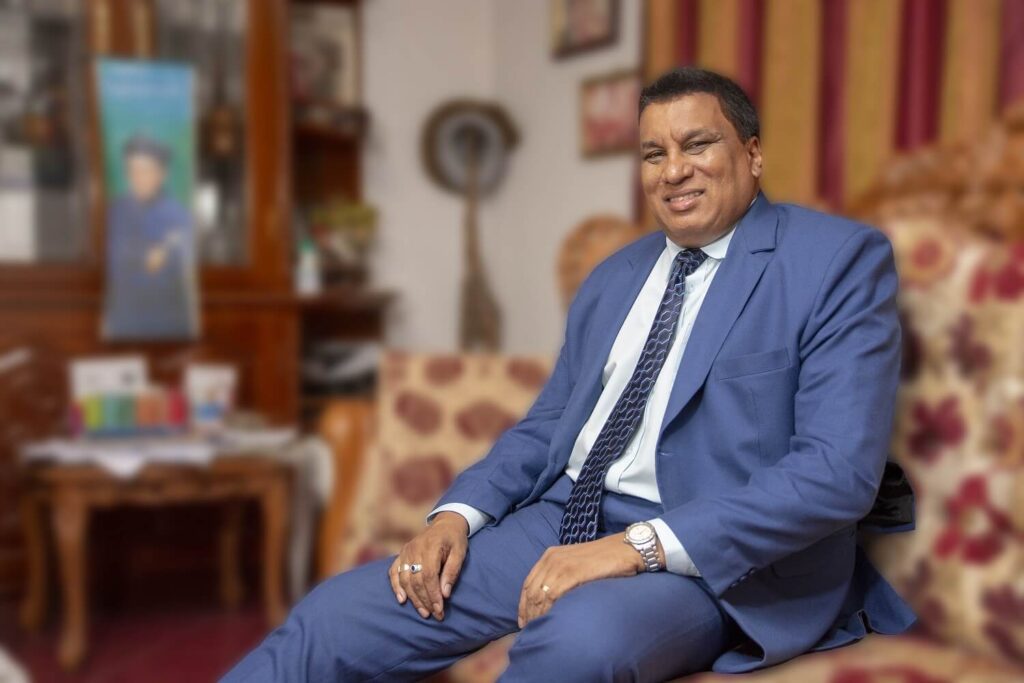Dr.Ashveen Kissoonah | ICT, Systems Integration & Transformational Management
Port Louis Digest had the pleasure to meet Dr. Ashveen Kissoonah over a hot cup of coffee and we learnt about the potentials and promises of wise investments and belief in IT with a special reading on the PORT sector. Backed with two and a half decades of hands on experience in ICT, Business Management and Professional Training, Dr. Ashveen Kissoonah held C-suite key positions locally and in the region. His main focus has been in the fields of Systems Integration, Transformational Management and Continuous Professional Development. He also managed Renewable Energy Projects namely in the Photovoltaic and Waste-to-Energy space.
On the academic front, his highest achievement is a Doctorate in Computer Networks and Information Security from the UK in 2004. He is a Fellow Member and Chartered IT Practitioner of the British Computer Society since 2009 and a Fellow Member of the Chartered Institute of Marketing since 2011.
Over the years as a seasoned professional in the area of innovation and technology, how would you describe the transformation process Mauritius has gone through over these past 40 years ?
Mauritius has done very well in its nation’s digital journey which kick started in the early eighties.
Free education at Primary and Secondary levels in 1976 followed by Post-Secondary level in 1988 has largely contributed in positioning the country among the top five highest literacy rates in the region. This initiative has led in building our Human Capital to respond to the country’s needs in various promising sectors and helped establish the different pillars of the economy.
Our ICT ecosystem comprises of a mix of public and private partners who have actively contributed in our country’s digital transformation process. The public entity has been instrumental in the setting up of the appropriate framework, legislation and infrastructure as the building blocks of that ecosystem and is spearheading the e-government stages of web presence, interaction, transaction and transformation in collaboration with the private partners.
The four types of e-government services namely: Government- to-Citizen (G2C), Government- to-Business (G2B), Government- to-Employee (G2E), and Government-to-Government (G2G) are all mainstream. Flagship projects include the Integrated Financial Management Information System for the Ministry of Finance, Economic Planning and Development, the Integrated Tax and Administration System for the Mauritius Revenue Authority, the Criminal Occurrence Tracking System for the Mauritius Police Force, the Passport and Immigration Office System under the purview of the Prime Minister’s Office and the MauPass which is a unique ID system to connect to a wide range of e-services.
On the other hand, our entrepreneurs left no stone unturned and had the vision to grow their business through investment in technology and innovation and attract major players such as Microsoft, Oracle, SAP, Huawei, HP, France Telecom, Accenture, Ceridian and Infosys to our shores. ICT companies nowadays cover the whole spectrum of products and services, inter-alia, infrastructure, platform, hardware assembly and repairs, software engineering, fiber manufacturing and installation, cloud computing, outsourcing, telecommunications, networking, DR, e/m- commerce, web, multimedia, publishing, digital printing and imaging, process control, AI, AR/VR, CAD/CAM, BPO (back office: billing and purchasing and front office: marketing and tech support), call centre, consultancy, after sales, maintenance and training.
The ICT and ITES market has created some thirty thousand jobs and counting.
Our digitalisation road map started in 1997 with the creation of the Ministry of Information and Telecommunications to formulate and implement policies regarding the development of the ICT sector.
The strategy was to start with the Institutional Framework and to allow for the smooth elaboration of an ICT master plan for shaping the scope, efficacy and governance.
Institutions such as the National Computer Board (the Policy arm to promote the development of Information and Communication Technologies) in 1987, the State Informatics Limited (the Software Development arm) in 1988, the Central Informatics Bureau (to plan and coordinate computerisation within the Civil Service) in 1989, the Mauritius Telecommunication Services rebranded as Mauritius Telecom in 1992 (provider of telephony and broadband services) and the State Informatics Training Centre (to dispense ICT training) were set up. Ultimately, the Information and Communications Technology Authority was established in 2001 as the Economic Regulator of the ICT sector.
Furthermore, to enable a conducive and compliant working environment for the progress of the sector, a sound Legal Framework comprising of the Electronic Transactions Act 2000, the Technologies Act 2001, the Computer Misuse and Cyber Crime Act 2003 and the Data Protection Act 2004 were enacted. In view of the major changes brought to the General Data Protection Regulation (GDPR) in 2018 by the European Union, with an extra-territorial reach, the data protection laws in Mauritius were amended to align with the GDPR.
To handle and respond to cyber security intelligence cell of the National Computer Board was created in 2008 as the Computer Emergency Response Team of Mauritius (CERT-MU). Reporting of incidents to CERT-MU is done on the Mauritian Cybercrime Online Reporting System. To host and deliver e-services to the general public at large and to non-citizens abroad, a centralised data centre; the Government On Line Centre was created in 2015.
The National ICT Strategic Plan (2007-2014) and the National Broadband Policy (2012–2020) coupled with the liberalisation of the Telecommunications sector at the end of 2002 triggered marked developments in the sector. The migration from an analogue to a digital telecommunications network powered added bandwidth, connectivity and stimulated value added services and the increased broadband penetration both mobile has contributed in our GDP growth (4.8% average figure from 2010-2017) and positioned ICT as an important pillar of our economy.
The Cyber City inaugurated in 2006 acted as a catalyst and fuelled ICT readiness (infrastructure and access), ICT intensity (usage level of ICTs in our society) and ICT impact (results and outcomes of more efficient and effective ICT). This initiative attracted various ICT companies to set base on premise and became an important engine for the promotion of socio- economic growth.
High bandwidth fiber optic submarine connectivity and fixed significant tariff reduction on international telecommunications via satellite and through the South Africa Far East (SAFE) cable, the Eastern Africa Submarine cable System (EASSy) cable, the Lower Indian Ocean (LION & LION2) cables boosted network traffic and wireless connectivity hence improving our competitiveness, sustainability and resilience to attract foreign investors and pave the way in realising the vision of an intelligent and smart Mauritius. This is very much in line with the Digital Mauritius 2030 Strategic Plan.
As an endorsement of our progress, the ICT Development Index from the International Telecommunications Union ranked Mauritius 1st in Africa and 72 worldwide out of 174 countries as at 2016. Concurrently our local stakeholders and entrepreneurs strengthened our progress by effectively communicating and collaborating through two main platforms namely the Mauritius IT Industry Association (MITIA) which regroups the major ICT companies and the Outsourcing and Telecommunications Association of Mauritius (OTAM) representing the interests of the Telecom operators and the ITES/BPO players.
To further stimulate economic development growth and citizens’ engagement, the Smart City Scheme was incepted in 2015 for the setting up of new and intelligent urban ecosystem and to leverage and build on the existing and upcoming ICT infrastructure. Six Smart City projects have been identified namely at Medine, Mon Tresor, Beau Plan, Moka, Cap Tamarin and JinFei.
Disruptive technologies such as Big data, IoT, Industry 4.0, Blockchain, Edge Computing, AI and Robotics, Digital Twin, Brain Computer Interface, Multi-Cloud, Machine and Deep Learning, Natural Languages, Touch Commerce, Cognitive Technology, LTE and 5G have recently taken the market by storm. Mauritius has lived up to challenges and is geared to capture upcoming opportunities in an attempt to stay ahead of the curve and realise our cyber ambition of becoming a smart island.




1 Comment
Great idea and professional thoughts